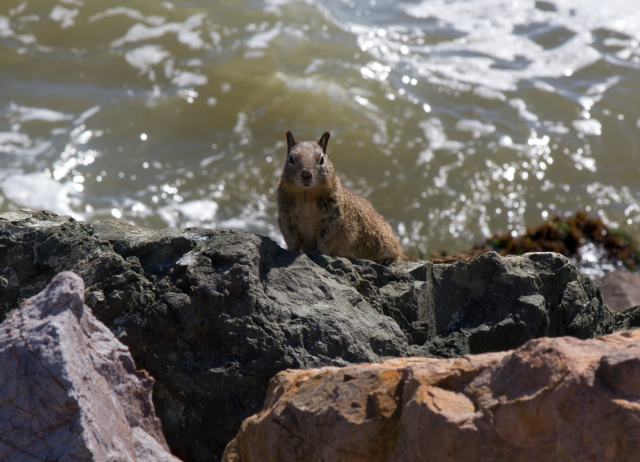The city does not plan to eliminate all the squirrels and gophers at the park. It just wants to reduce the population, he said.
The number of squirrels and gophers in the park is considerable, and the heaviest concentration is along the paths that traverse the perimeter of the park, said Chakko. In these areas, there is a higher concentration of tunnels and holes than in the center of the park, and it is the density that poses a risk.
And it turns out well-meaning Berkeley residents are creating the problem. Even though there are signs at the park telling people not to feed the animals, the message is frequently ignored. Many people come to the park and toss birdseed and peanuts around.
“It’s the overfeeding by people that has caused the overpopulation there,” Chakko said.
Berkeley used the area as a landfill from 1961 to 1983, said Chakko. It was closed in stages between 1981 and 1990. A clay cap lines the bottom, clay dikes act like walls, and a clay layer covers the landfill. There is dirt on top of that, and that soil is what the rodents are disturbing.
In 2009, the San Francisco Bay Regional Water Quality Control District ordered Berkeley to eliminate the squirrels. The city tried various methods to get rid of the rodents. It tried to encourage natural predators to come to the park by building owl boxes and perches for raptors. While spotting burrowing owls has become a favorite Berkeley pastime, their presence has not reduced the overpopulation of squirrels.
Berkeley cannot trap and move the rodents, as that is against state law. It cannot lace the area with poison – which might be quicker and less expensive – because that would affect other species. Its best approach is to trap and abate the squirrels, according to a city report.
The City Council voted last week to hire Animal Damage Control, a pest control company, to run a pilot program. ADC will fence off a a 1-acre area at the northwest corner of Cesar Chavez Park and place 24 mechanical baited traps around, according to a staff report given to council. (The traps are small, so they will not capture other animals.) The company will check the traps twice a day for three weeks. The company will also set up mechanical, non-baited cinch tunnels underground to trap gophers. These traps will be checked every three days.
If the pilot program succeeds, the city will consider expanding it to other areas in the 90-acre park, said Chakko.
“We’re doing our best to protect people, wildlife, pets and the bay ecosystem,” said Chakko. “All of those thing have to be in balance. This was the least impactful way we could do this."
Want to get a digest of all the day’s Berkeley news in your email inbox at the end of your working day? Click here to subscribe to Berkeleyside’s free Daily Briefing.
